Application developers are the architects behind the software solutions that power our digital world. They design, build, and maintain applications that meet user needs and business requirements, ensuring functionality and performance.
Application development skills encompass proficiency in programming languages such as Java, Python, or C#, as well as abilities in problem-solving, debugging, and collaboration.
Candidates can write these abilities in their resumes, but you can’t verify them without on-the-job Application Developer skill tests.
In this post, we will explore 8 essential Application Developer skills, 10 secondary skills and how to assess them so you can make informed hiring decisions.
Table of contents
8 fundamental Application Developer skills and traits
The best skills for Application Developers include Programming Languages, Database Management, Version Control, API Integration, Debugging and Testing, UI/UX Design, Cloud Services and Security Best Practices.
Let’s dive into the details by examining the 8 essential skills of a Application Developer.
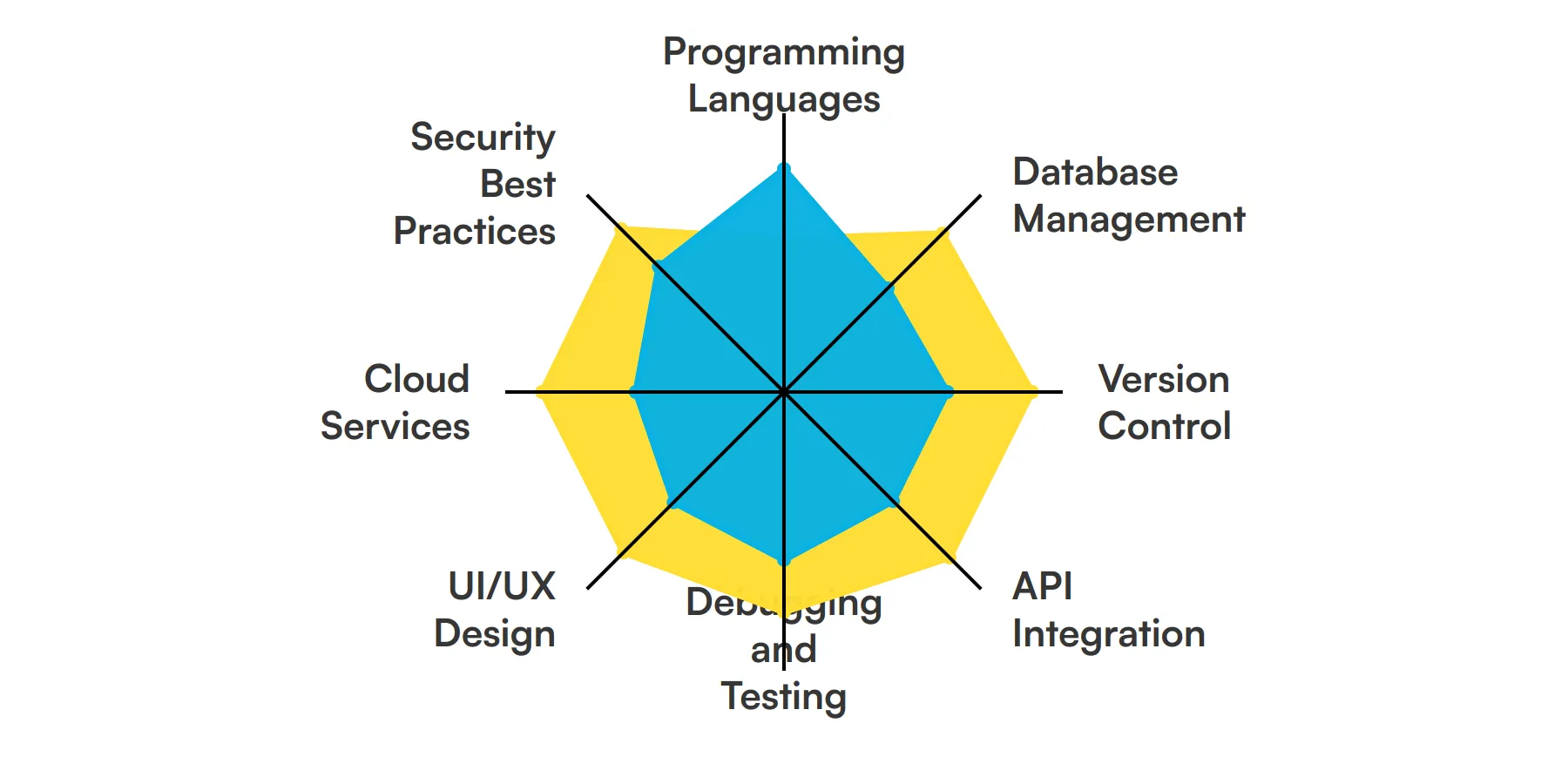
Programming Languages
An application developer must be proficient in multiple programming languages like Java, Python, or JavaScript. These languages are the building blocks for creating software applications, and knowing them allows developers to write efficient and maintainable code.
For more insights, check out our guide to writing a Software Developer Job Description.
Database Management
Understanding how to manage and interact with databases is crucial for an application developer. This includes knowledge of SQL and NoSQL databases, which are used to store and retrieve data efficiently, ensuring the application runs smoothly.
Version Control
Version control systems like Git are essential for tracking changes in the codebase. They allow developers to collaborate seamlessly, manage different versions of the application, and roll back to previous states if something goes wrong.
Check out our guide for a comprehensive list of interview questions.
API Integration
Application developers often need to integrate third-party services into their applications. Knowing how to work with APIs (Application Programming Interfaces) enables them to extend the functionality of their software by connecting it with other systems.
Debugging and Testing
Debugging and testing are critical skills for ensuring the application works as intended. Developers use various tools and techniques to identify and fix bugs, and to write tests that verify the functionality and performance of their code.
For more insights, check out our guide to writing a Software Tester Job Description.
UI/UX Design
While not always the primary focus, understanding the basics of UI/UX design helps developers create user-friendly applications. This involves designing intuitive interfaces and ensuring a smooth user experience.
Cloud Services
Knowledge of cloud services like AWS, Azure, or Google Cloud is increasingly important. Application developers use these platforms to deploy, manage, and scale their applications, taking advantage of the cloud's flexibility and resources.
Check out our guide for a comprehensive list of interview questions.
Security Best Practices
Security is a top priority for any application developer. Understanding security best practices helps in protecting the application from vulnerabilities and ensuring data privacy and integrity.
10 secondary Application Developer skills and traits
The best skills for Application Developers include Agile Methodologies, Mobile Development, DevOps, Cross-Platform Development, Performance Optimization, Networking Basics, Containerization, Code Review, Continuous Integration and Project Management Tools.
Let’s dive into the details by examining the 10 secondary skills of a Application Developer.
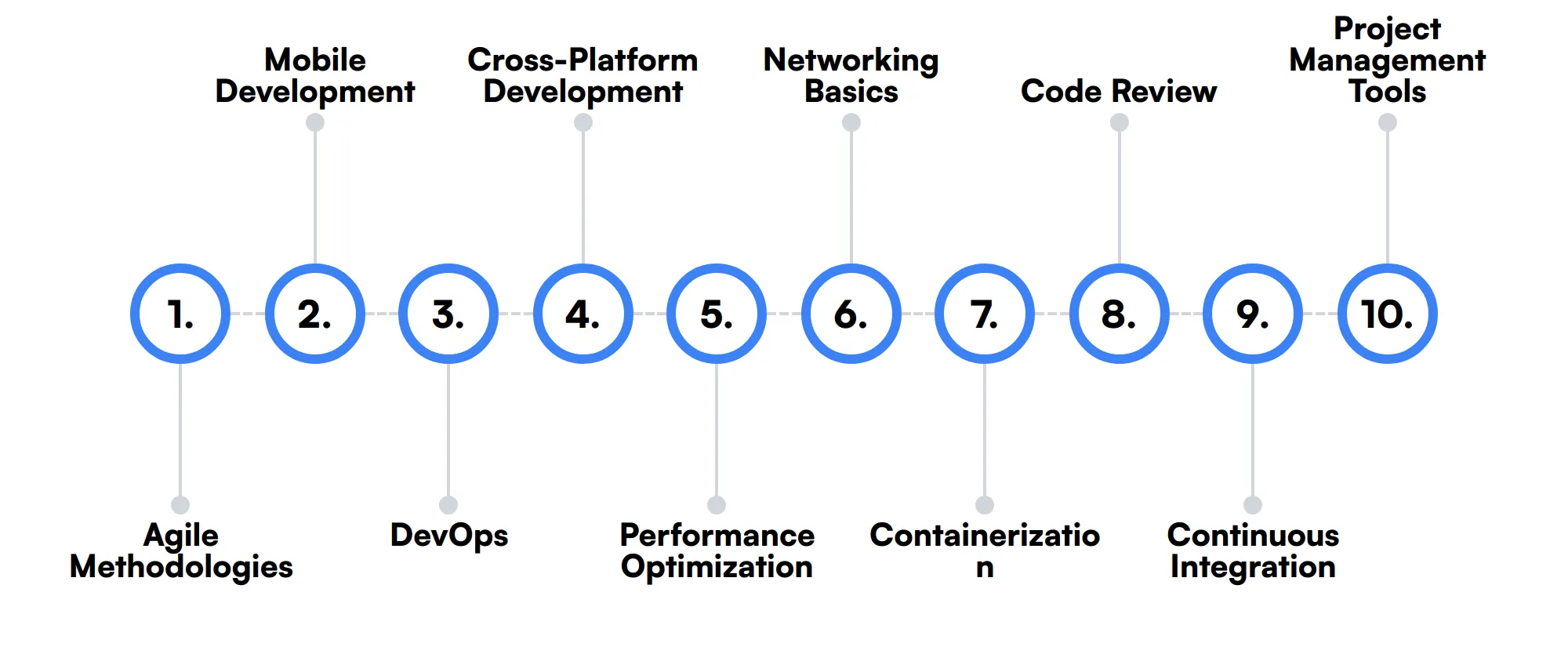
Agile Methodologies
Familiarity with Agile methodologies like Scrum or Kanban can help developers work more effectively in a team environment. These frameworks promote iterative development and continuous improvement.
Mobile Development
Knowledge of mobile development frameworks like React Native or Flutter can be beneficial. This allows developers to create applications that run on both iOS and Android platforms.
DevOps
Understanding DevOps practices can streamline the development and deployment process. This includes knowledge of CI/CD pipelines, containerization with Docker, and orchestration with Kubernetes.
Cross-Platform Development
Skills in cross-platform development tools like Xamarin or Electron enable developers to create applications that work across different operating systems, reducing the need for separate codebases.
Performance Optimization
Knowing how to optimize the performance of an application is important for providing a good user experience. This involves techniques for reducing load times, improving responsiveness, and managing resources efficiently.
Networking Basics
Basic knowledge of networking can help developers understand how their applications interact over the internet. This includes understanding protocols, IP addressing, and network troubleshooting.
Containerization
Containerization tools like Docker allow developers to package applications and their dependencies into a single container. This ensures consistency across different environments and simplifies deployment.
Code Review
Participating in code reviews helps maintain code quality and fosters knowledge sharing within the team. It’s a collaborative process where developers critique each other's code to catch potential issues early.
Continuous Integration
Continuous Integration (CI) practices involve automatically testing and integrating code changes. This helps in identifying issues early and ensures that the application remains stable as new features are added.
Project Management Tools
Familiarity with project management tools like Jira or Trello can help developers keep track of tasks, deadlines, and project progress. These tools facilitate better organization and communication within the team.
How to assess Application Developer skills and traits
Assessing the skills and traits of an Application Developer can be a challenging task, given the diverse range of technical proficiencies required. From programming languages and database management to UI/UX design and security best practices, a comprehensive evaluation is necessary to ensure a candidate's suitability for the role.
Traditional resumes and interviews often fall short in providing a complete picture of a candidate's abilities. Skills-based assessments offer a more reliable method to gauge an applicant's competencies and fit for your specific needs. By focusing on practical tasks and real-world scenarios, these assessments can reveal the true depth of a developer's expertise.
For instance, Adaface provides a variety of tailored assessments that can help you evaluate key skills such as API integration, debugging and testing, and cloud services. These Adaface on-the-job skill tests not only improve the quality of hires by 2x but also reduce screening time by 85%.
Let’s look at how to assess Application Developer skills with these 6 talent assessments.
Computer Programmer Coding Aptitude Test
Our Computer Programmer Coding Aptitude Test evaluates candidates on their ability to solve problems using programming concepts, logic, and analytical thinking. It is designed to assess a broad range of programming skills, including algorithms, data structures, and programming paradigms.
The test assesses candidates' understanding of programming logic, syntax, and their ability to develop solutions using programming concepts. It challenges candidates to analyze problems, identify patterns, and write functional code using various programming languages.
Successful candidates demonstrate a strong grasp of technical aptitude and coding skills, which are critical for effective problem-solving and software development.
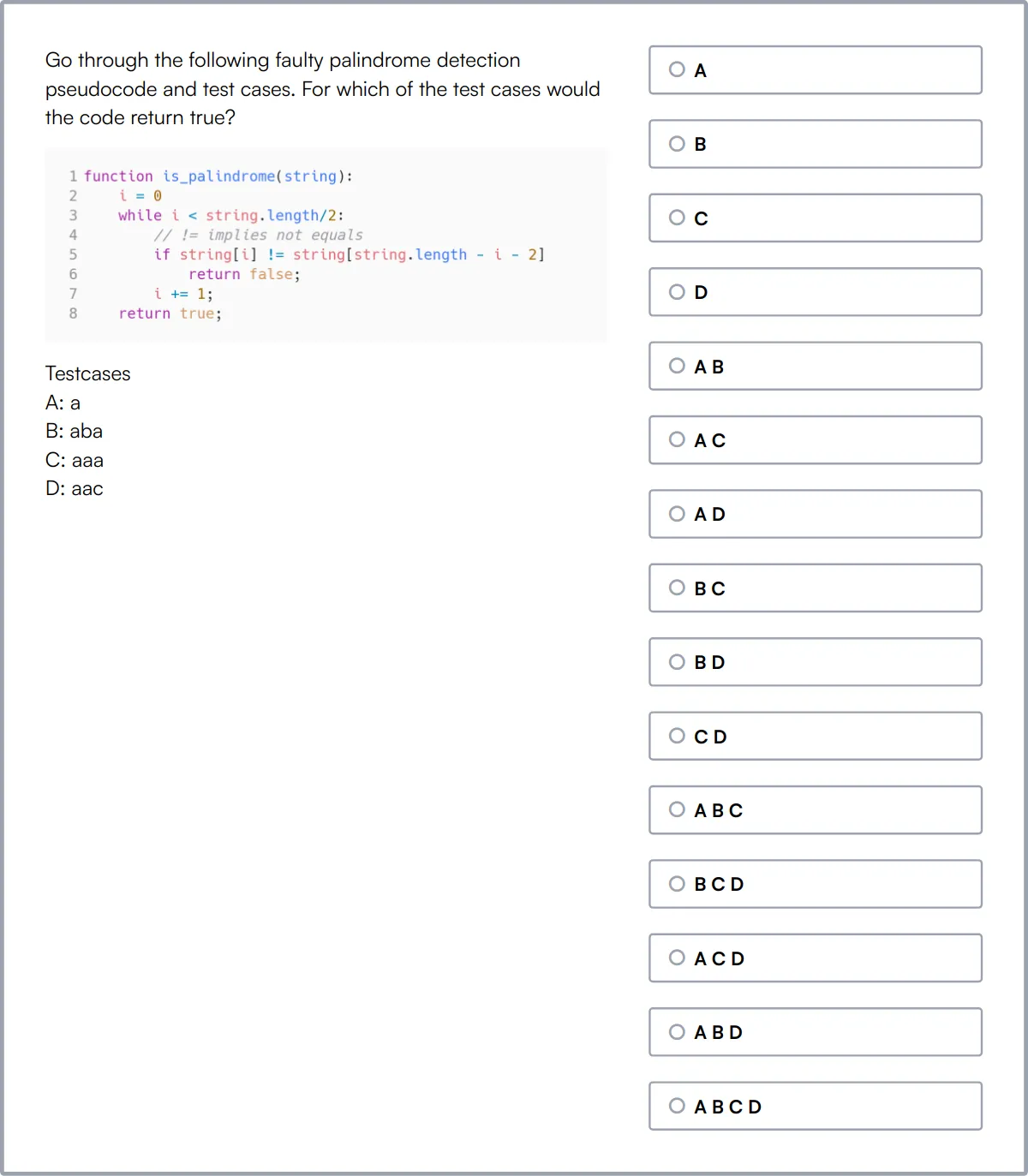
MySQL Online Test
Our MySQL Online Test is designed to evaluate candidates on their proficiency with MySQL, focusing on SQL queries, database design, and data manipulation. It covers essential aspects of database management and manipulation using MySQL.
This test evaluates a candidate's ability to work with MySQL databases, including knowledge of normalization, indexing, joins, and transactions. It aims to assess their skills in both Data Manipulation Language and Data Definition Language.
Candidates who score well on this test are proficient in managing and manipulating data effectively using MySQL, showcasing their capabilities in database design and SQL query optimization.

Git Online Test
Our Git Online Test assesses a candidate's understanding of Git, a widely used version control system. The test evaluates both basic and advanced Git commands and concepts.
The test challenges candidates on their ability to manage source code using Git, including branching, merging, committing changes, and resolving conflicts. It also tests their knowledge of remote repositories and rebasing.
High-scoring candidates demonstrate a comprehensive understanding of Git workflows and commands, essential for efficient source code management and team collaboration.
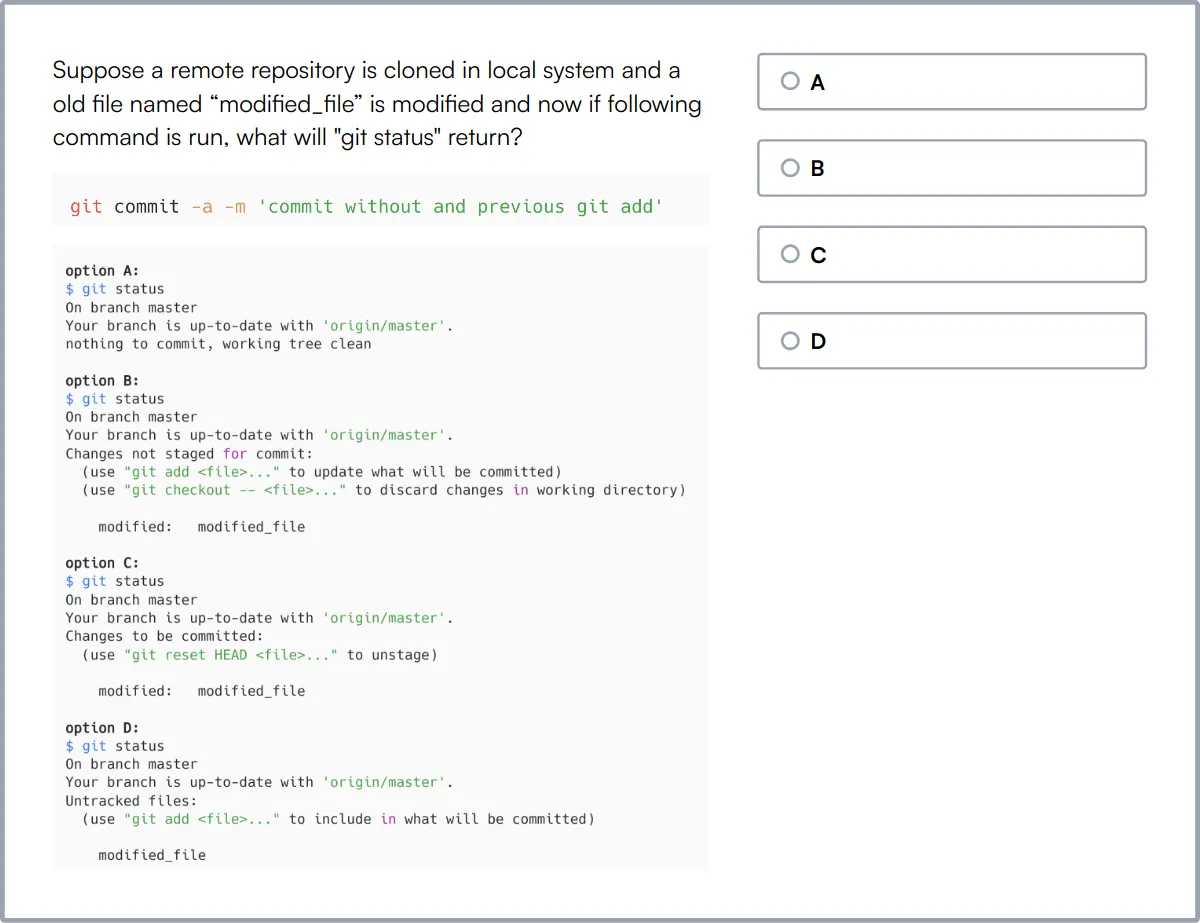
REST API Test
Our REST API Test evaluates candidates on their understanding of RESTful APIs and their ability to interact with and design these APIs. The test includes questions on API design, best practices, and backend service architecture.
Candidates are tested on their knowledge of REST principles, HTTP methods, status codes, authentication, and serialization formats. The test aims to assess their ability to create and test effective RESTful services.
Successful candidates will demonstrate a strong ability to design and implement REST APIs that are efficient and adhere to best practices, crucial for modern backend services.
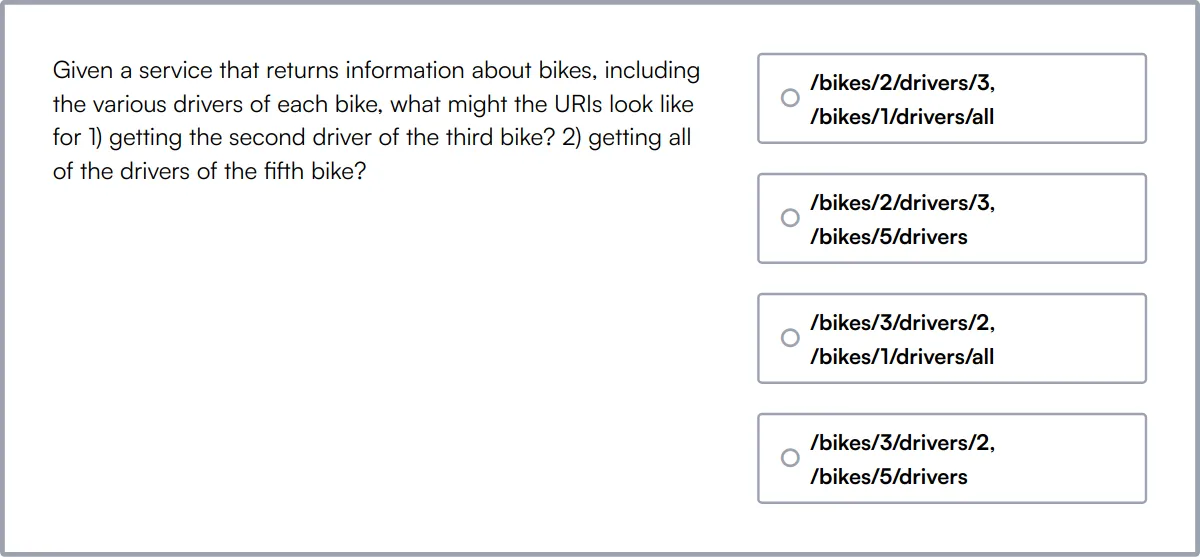
Selenium Online Test
Our Selenium Online Test assesses candidates on their ability to use Selenium WebDriver for automation testing. It evaluates knowledge of Selenium's architecture, features, and its application in cross-browser testing.
The test covers various aspects of Selenium, including interacting with live websites, API testing, and building frameworks for automated testing. It also assesses candidates' skills in data-driven and hybrid testing frameworks.
Candidates excelling in this test demonstrate proficiency in using Selenium for comprehensive automation testing, which is key for developing efficient quality assurance processes.
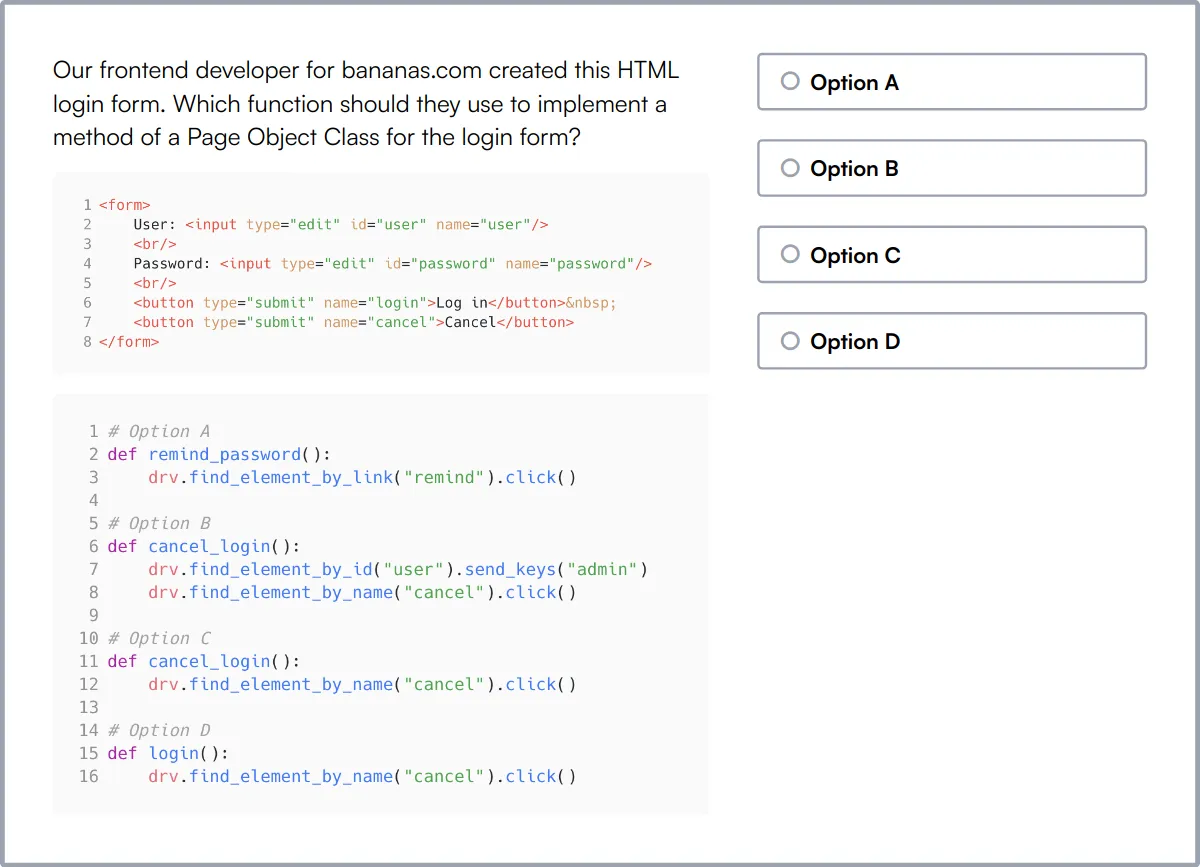
UI/UX Design Test
Our UI/UX Design Test focuses on assessing candidates' skills in UI and UX design, including wire-framing, prototyping, and user research techniques. It evaluates their ability to design effective user interfaces and experiences.
The test examines candidates on design thinking, UX design principles, interaction design, and visual design principles. It aims to assess their capability to create intuitive and attractive designs for various digital platforms.
High-scoring candidates are proficient in creating designs that enhance user engagement and satisfaction, reflecting their deep understanding of user-centered design principles.
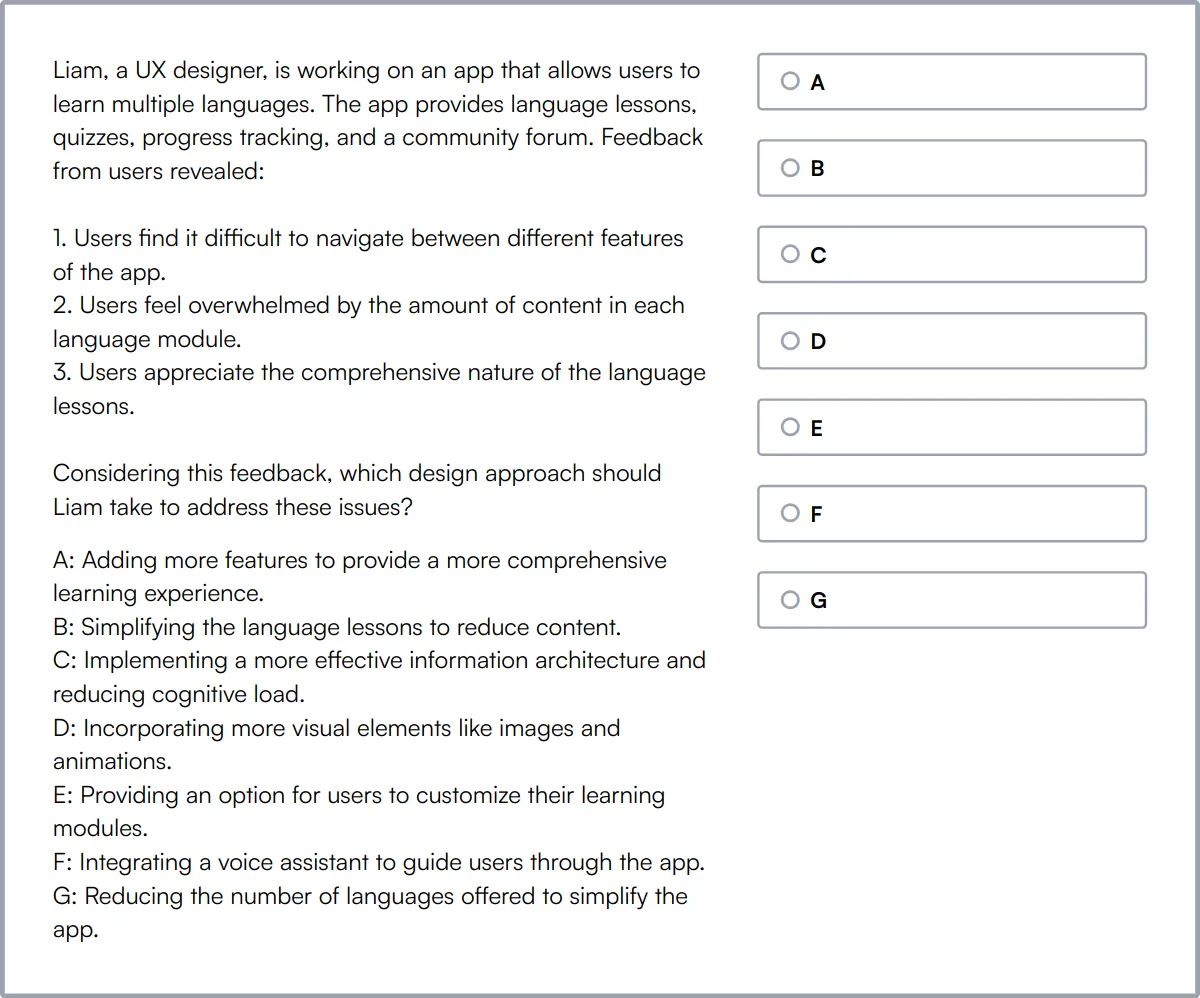
Summary: The 8 key Application Developer skills and how to test for them
| Application Developer skill | How to assess them |
|---|---|
| 1. Programming Languages | Evaluate proficiency in writing clean, maintainable, and efficient code. |
| 2. Database Management | Assess ability to design, query, and manage databases effectively. |
| 3. Version Control | Check skills in tracking changes and collaborating using version control systems. |
| 4. API Integration | Determine capability to integrate and utilize third-party APIs. |
| 5. Debugging and Testing | Evaluate skills in identifying and fixing bugs and writing test cases. |
| 6. UI/UX Design | Gauge ability to create intuitive and visually appealing user interfaces. |
| 7. Cloud Services | Assess knowledge in deploying and managing applications on cloud platforms. |
| 8. Security Best Practices | Check understanding of implementing security measures in applications. |
Oracle AIA Online Test
Application Developer skills FAQs
What programming languages should an application developer know?
An application developer should be proficient in languages like Java, Python, JavaScript, C#, and Swift. The specific languages depend on the platform and type of applications being developed.
How can recruiters assess database management skills?
Recruiters can assess database management skills by asking candidates to design a simple database schema, write SQL queries, and discuss their experience with different database systems like MySQL, PostgreSQL, or MongoDB.
Why is version control important for application developers?
Version control systems like Git help developers track changes, collaborate with team members, and manage code versions. It ensures code integrity and facilitates teamwork.
What is the role of API integration in application development?
API integration allows applications to communicate with external services. Developers should be able to work with RESTful and SOAP APIs, handle authentication, and manage data exchange.
How do you evaluate debugging and testing skills?
Evaluate debugging and testing skills by asking candidates to identify and fix bugs in a sample code. Discuss their experience with testing frameworks like JUnit, Selenium, or Jest.
What are the key aspects of UI/UX design for developers?
Developers should understand basic UI/UX principles, such as user-centered design, accessibility, and responsive design. They should be able to create intuitive and visually appealing interfaces.
How important are cloud services for application developers?
Cloud services like AWS, Azure, and Google Cloud are essential for modern application development. Developers should know how to deploy, manage, and scale applications in the cloud.
What are some common project management tools used by application developers?
Common project management tools include Jira, Trello, and Asana. These tools help developers track progress, manage tasks, and collaborate with team members.

40 min skill tests.
No trick questions.
Accurate shortlisting.
We make it easy for you to find the best candidates in your pipeline with a 40 min skills test.
Try for freeRelated posts
Free resources



